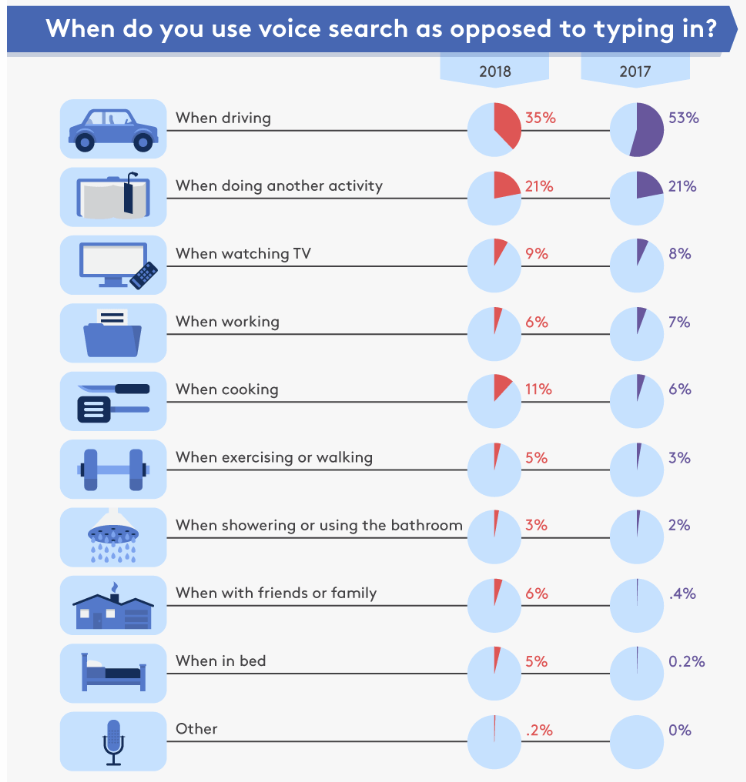As marketers, many of us tend to have an interesting case of “shiny new object” syndrome from time to time. In the SEO world, voice search has certainly been that shiny new object over the past couple years.
When looking at generalized statistics on the matter, it’s easy to jump to conclusions.
For example, studies have found that half of all searches will be voice search by 2020. Additionally, 65% of adults aged 25 to 49 use voice search at least once a day.
These objective numbers definitely make it seem like you must prioritize voice search, or be left in the dust.
Truth be told, sinking tons of time and effort into voice search is not absolutely critical for every business.
While it definitely holds more weight in some industries than others, you need to take a close look into your own operations and see exactly how voice search factors in.
Here are a few critical questions to ask yourself before diving head first into voice search optimization.
Are You Covering the Basics?
In the process of optimizing for voice search, it’s easy to get caught up in key tasks like pinpointing long-tail keywords, common questions, and semantically-related keywords relevant to what you offer.
While these are certainly critical to rank on voice searches, you cannot prioritize them over key SEO components (e.g., loading speed, mobile friendliness, indexability, AMP, structured data).
Failing to take care of the foundational SEO elements is going to derail any voice strategy, no matter how good it might seem.
It’s important to note that the entire concept of voice search is closely tied to mobile. Moreover, with Google’s Speed Update in 2018, the wiggle room for slow-loading sites on mobile searches has become even smaller.
If your loading speed on mobile isn’t optimized, you are putting your voice strategy at an extreme disadvantage.
Regardless of how voice search factors into your strategies, you need to keep a good focus on common site speed practices like optimizing images, compressing files, reducing response time, etc.
Moving on, you need to make sure you are using structured data to improve your chances of ranking on the SERPs. This schema markup should include information related to products, places, reviews, organizations, and so on.
While structured data won’t directly impact your search rankings, it can make your content more relevant for specific voice searches.
It is also a key factor that makes your content easy to consume on mobile searches both for Google bots and users.
One more crucial piece of information to take home is that HTTPS dominates voice search on Google. In fact, more than 70% of Google Home results are secured with HTTPS.
If you have come to the conclusion that your business can benefit from voice search optimization, you need to be careful and not neglect the basics in favor of the shiny new thing.
What Types of Questions Are You Answering?
When it comes to voice search, one of the most common pieces of advice is to create answer-driven content around pressing questions.
This is perhaps the biggest fallacy in the notion that “every business needs to be optimizing for voice.”
Think about it, are people really using voice search to find what you offer?
Before you go straight into the deep end with this, you should have a strong understanding of the intent behind the questions people are asking pertaining to your website.
For the most part, when people ask Google a question via voice, they are looking for concise answers to short questions.
- “What’s the weather like outside?”
- “Barber shops near me.”
- “Where is the closest gas station?
The vast majority of searchers aren’t likely using voice search to learn about things like developing a content marketing strategy or building a website.
Voice search optimization can potentially do a lot to get websites to rank for direct, frequently asked questions. So, you need to take an in-depth look and understand how voice search will impact your bottom line.
- What are the quick questions that pertain to your website?
- How well do they correlate to the main points you cover?
- Where do these answers fall into your customer journey?
An interesting study by Higher Visibility analyzed when people use voice search instead of typing it out. Here were the results:

Using this information, think logically. How often do you think people would be searching for your business while they are cooking?
If you run a website offering unique vegetarian recipes, optimizing for voice would make sense.
On the other hand, if you are promoting a software solution on content marketing analytics, voice probably won’t be too big of a factor in how you rank on the SERPs.
Generally speaking, if you are answering super in-depth and complex questions, spending a ton of money and effort optimizing for voice might not be a very fruitful approach.
On the other hand, if you answer more straightforward questions, or are a local brick-and-mortar store, voice search is going to play a big role in how you rank on searches which leads me to my next point.
How Locally-Geared Are You?
Voice search and local SEO go together like peanut butter and jelly.
Nearly half of voice search users look for a local business on a daily basis, according to a BrightLocal study.
So, given this information, local businesses are the ones that need to be heavily focusing on voice search.
To get more specific, the same BrightLocal study found that voice searchers are most likely to search for restaurants, grocery stores, and food delivery.
Now, if you aren’t in one of these three categories, it doesn’t mean you should ditch voice search.
If you are a local business looking to get voice visibility, there are several key pieces of information you need to account for in optimizing your online presence:
- Proximity to the searchers
- Social conversations
- Reviews
- Relevant backlinks
- Listings on industry-specific/local directories (keeping them updated)
- Website content crafted to long-tail local keywords
Voice search doesn’t just apply to local businesses. However, they stand to gain a lot (maybe even the most) from a good voice strategy.
Wrapping Up
Voice search is still very much in the infancy stages of development.
Unfortunately, as it currently stands, there is no straightforward ways or reporting tools for marketers to track their exact voice search analytics.
The closest thing is to go on Google Search Console and try to pick out which traffic driving queries appear conversational. The result is that the insights are not always reliable.
To end this post, I want to make it clear:
Voice search is important.
However, voice search is not a dire necessity for all businesses, as some pieces of content might lead you to believe.
More Resources:
- Voice Search Optimization: 6 Big Changes You’ll Need to Make
- 3 Content Optimization Tips for Voice Search Success
- 5 Voice Engine Optimization Strategies to Get Ahead
Image Credits
Featured Image: Created by author, April 2019
Screenshot taken by author, April 2019




